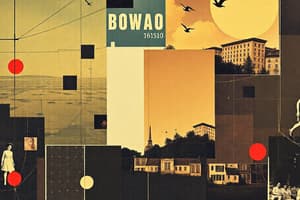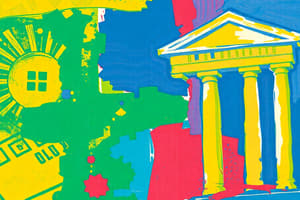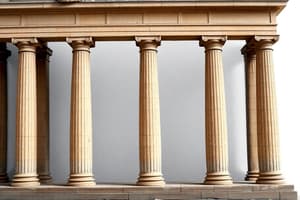Podcast
Questions and Answers
What types of writings are included in Latin literature?
What types of writings are included in Latin literature?
- Only essays and histories written in the Latin language by Roman authors
- Essays, histories, poems, plays, and other writings written in the Latin language by Roman authors as well as European writers after the fall of the Empire (correct)
- Essays, histories, poems, plays, and other writings written in the Latin language by Roman authors only
- Only plays and poems written in the Latin language by Roman authors
When did formal Latin literature begin?
When did formal Latin literature begin?
- 14 BC
- 240 AD
- 14 AD
- 240 BC (correct)
Who wrote the historical epic on the first Punic War in early Latin literature?
Who wrote the historical epic on the first Punic War in early Latin literature?
- Quintus Ennius
- Marcus Terentius Varro
- Livius Andronicus
- Gnaeus Naevius (correct)
When did the Golden Age of Latin literature end?
When did the Golden Age of Latin literature end?
Who wrote the pastoral Eclogues, the Georgics, and the Aeneid during the Augustan Age of Latin literature?
Who wrote the pastoral Eclogues, the Georgics, and the Aeneid during the Augustan Age of Latin literature?
Who emerged during the Imperial Period of Latin literature and developed the epigram?
Who emerged during the Imperial Period of Latin literature and developed the epigram?
What is a notable feature of Latin language that lends itself to elaboration and conciseness?
What is a notable feature of Latin language that lends itself to elaboration and conciseness?
What did Roman writers do to give familiar vocabulary poetic value?
What did Roman writers do to give familiar vocabulary poetic value?
What did Rome's leading poets have great technical skill in?
What did Rome's leading poets have great technical skill in?
Flashcards
Latin Literature
Latin Literature
Writings in Latin by Roman authors (Cicero, Virgil, Ovid, Horace) and later European writers.
Early Latin Literature
Early Latin Literature
Comedies, tragedies (Livius Andronicus), historical epic (Quintus Ennius), and epic poem on the Punic War (Gnaeus Naevius).
Age of Cicero
Age of Cicero
Cicero's letters, orations, Caesar and Sallust's historical writings, Catullus and Lucretius's poetry, and Varro's writings.
Augustan Age
Augustan Age
Signup and view all the flashcards
Imperial Period
Imperial Period
Signup and view all the flashcards
Latin's Syntax
Latin's Syntax
Signup and view all the flashcards
Poetic Value
Poetic Value
Signup and view all the flashcards
Roman Poet Skills
Roman Poet Skills
Signup and view all the flashcards
Study Notes
Latin Literature: An Overview
- Latin literature includes essays, histories, poems, plays, and other writings written in the Latin language by Roman authors such as Cicero, Virgil, Ovid, and Horace, but also includes the works of European writers after the fall of the Empire.
- Formal Latin literature began in 240 BC with the first stage play in Latin performed in Rome.
- Early Latin literature included comedies and tragedies adapted from Greek drama by Livius Andronicus and others, an historical epic by Quintus Ennius, and an epic poem in Saturnian Meter on the first Punic War by Gnaeus Naevius.
- The Golden Age of Latin literature is usually said to have begun with the first known speech of Cicero in 81 BC and ended with the death of Ovid.
- The age of Cicero saw the production of the letters, rhetorical treatises, philosophical works, and orations of Cicero, as well as the historical writings of Julius Caesar and Sallust, the lyric poetry of Catullus and Lucretius, and the learned writings of Marcus Terentius Varro.
- The Augustan Age of Latin literature saw the publication of Virgil's pastoral Eclogues, the Georgics, and the Aeneid, Horace's Epodes, Odes, Satires, and Epistles, and the Latin elegy of Tibullus, Propertius, and Ovid.
- The Imperial Period of Latin literature from the death of Augustus in AD 14 until about 200 saw the emergence of new and startling ways of expression by Seneca, Lucan, Petronius, Martial, Juvenal, Tacitus, and Suetonius, as well as the development of the epigram by Martial.
- Latin continued to be used as the lingua franca among the learned throughout Europe in the Middle Ages, Renaissance, and Early Modernity, with the great works of Descartes, Francis Bacon, and Baruch Spinoza all being composed in Latin.
- Latin writing reflects the Romans' interest in rhetoric and public speaking, and Latin authors became masters of the art of variety.
- Latin is a highly inflected language, lending itself to elaboration and conciseness, and can be used with sweeping phrases or tight syntax.
- Latin lacks poetic vocabulary that marks Greek poetry, but Roman writers gave familiar vocabulary poetic value by combinations of words and rich sound effects.
- Rome's leading poets had great technical skill in the choice and arrangement of language and an intimate knowledge of the Greek poets, whose themes appear in almost all Roman literature.
Studying That Suits You
Use AI to generate personalized quizzes and flashcards to suit your learning preferences.




